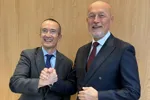The Ford of Britain chairman pinpoints two big decisions during his 38-year automotive career, each of which had very different results.
Both concern Jaguar, where he spent 20 years as director of sales and marketing. Putnam joined in 1982 while Jaguar was under British Leyland’s stewardship, upping his family’s roots from Norwich and moving to the Midlands. That, in itself, was a risky decision, made even more apparent when on arrival he was told to save Jaguar or close it. The first action was to tell 200 Jaguar dealers they would not be retaining the franchise.
“I inherited 300 dealers in Britain and had to make a decision that while growing sales volume I would take the risk of parting company with two-thirds of the network,” says Putnam. “It would’ve been very easy to stay where we were – but the dealers were making losses and so were we. It was my biggest and most focused challenge, but the risk was worth taking.”
In 1999, Jaguar was buoyant, having trebled sales volume over a four-year period and passing the 15,000 mark. By then Ford had acquired the business and its senior management in Detroit believed the brand, largely appealing to the over-55s, could be stretched to 35-year-olds.
Decision number two: Putnam opposed the move. “I laid down in the tracks for a while and told them a brand, especially a luxury brand, will not go where it does not want to – you can only get it to change over a long time with a succession of relevant products. But no-one was listening.
“The fact I didn’t resist for long enough was a mistake. It’s now recognised by Ford Motor Company that they tried to change the brand far too fast. And some of the problems Jaguar has been facing can be traced to then. It’s starting to come back to full health now, though.”
Clearly a good manager needs to be passionate about the brand, understand the nature of the business and its influences, and be obstinate in decision taking. That stubbornness – and willingness to take a risk – is becoming more difficult in today’s complex business environment.
And with senior managers swapping roles so regularly, it means fewer people are able to really learn from their mistakes.
“I was lucky in my early career: there was so much potential with Lotus and Jaguar that even if you made a decision that was 100% wrong you were still right. I was able to learn an awful lot about what was a good decision and what was a bad decision without causing chaos,” says Putnam.
“Today the risks are more obvious and the margins for error are much tighter. But I would still encourage young managers to learn from making mistakes. One of the big problems these days is that people may never know whether they have made a good decision because it can take 18 months or more for the outcome.”
Putnam is the first Ford of Britain chairman who didn’t start his career at the blue oval, credited as the proving ground for many of today’s high ranking automotive executives; he started at Lotus in 1966, having answered a job ad for an export sales manager. Before that he worked at the banking subsidiary of Courtaulds which provided a chance to use his extensive language skills, but didn’t fulfil a desire to get involved with motor sport. Lotus did, and Putnam helped introduce the Cosworth engine during a period where Lotus racked up consecutive Formula One victories.
At Lotus, Putnam worked for one of toughest men in motor industry at the time – Colin Chapman. “Somebody once said that if you went for country walk with him you’d end up climbing Everest. That’s what it was like. He taught me to never be under ambitious, but also not to replicate some of his traits. I set my business persona to correct things I didn’t like about him but also to adopt the things I thought he was fantastic at, which were communication, detail and lateral thinking.”
Putnam was running Lotus’ global sales and marketing aged 28, undertaking a similar role at Jaguar seven years later. “I guess that kind of prompted this whole debate: are there people in their 30s now who are ready to take on those complex global roles? We should be able to spot the rising stars.”
He’s looking for executives who create team spirit and inspire loyalty and respect – people with business acumen and who are committed to doing the jobs that make a difference, particularly when it’s something they do not enjoy doing. They need to understand the importance of communication and be bright – but not so bright they always find an intellectual answer.
“The most important thing is to act like a leader. Complacency is an insidious fault: the traps are arrogance and having a ‘know-it-all’ attitude, and that filters down from the top,” says Putnam. “To be a leader, you must act like a leader.”















Login to comment
Comments
No comments have been made yet.